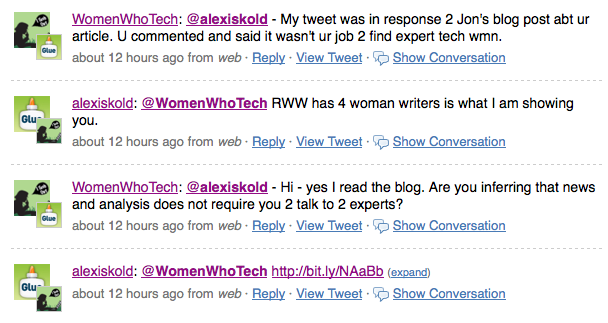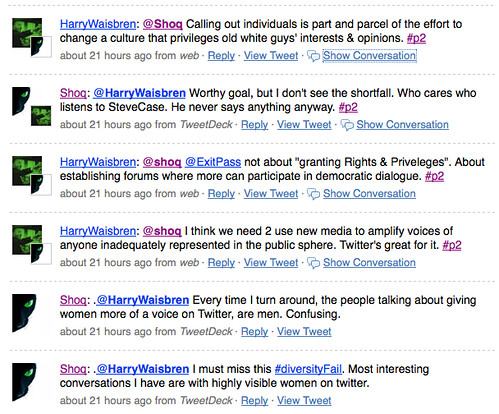DRAFT! Work in progress!
Update, July 9: my brother Greg of The Happy Accident had some great feedback on this draft: he didn’t know until the last paragraphs why he was reading it. Until then, it seemed like an attack on Alex — which wasn’t at all my intention.  Why we do drafts, chapter 1023 and counting; thanks, Greg, for the feedback.  Apologies to all for any offense or misimpression. I revised the final version of the post substantially.
Alex Iskold’s Free: It Works, It Cries, It Bites on ReadWriteWeb is a roundup of reactions to Chris Anderson’s new book FREE — as well as his own opinion that free can be dangerous. Â Alex does a nice job summarizing opinions from Malcolm, Seth, Mike, Fred, Mark, and Brad … hey, wait a second, I’m noticing a pattern here …
Alex replied to me on Twitter, asking for links to posts by women and saying he’d be happy to add them. Janet Maislin’s Absolutely, Positively Free … if You Think You Can Afford It from the New York Times was near the top of Google’s main page so I sent him the link — and also suggested that he try reaching out to women. After thanking me, he told me that he thought it was better not to reach out.
Responses like this don’t even surprise me at this point. Shireen Mitchell (aka @digitalsista) of Social Media Women of Color describes this as a “your problem not ours” attitude: we can’t find them, so it’s not our fault. Intelligent women with plenty to say on this subject are out there, and easy to find if you make the effort. If you don’t bother, who else is responsible?
A big problem with not reaching out is that it tends to confirm your own blind spots. For example, in environments where you’re listening primarily to guys, you’re a lot less likely to hear women’s perspectives.  Virtually all the commenters on Alex’ ReadWriteWeb post are male;* so is just about everybody who replies to or retweets him on Twitter. And if the guys you’re talking with and listening to are the kind of guys who don’t talk a lot with women — like Chris Anderson, apparently, at least based on his blog and Twitter feed** — then you get what network theorists would describe as a clique of male nodes with preferential attachment to other male nodes.
Guys talking to guys who talk about guys.
It’s not like this is new behavior . Shelley Powers described it vividly four years ago in Guys don’t link. Plenty of others have documented it too.*** So you’d think I’d be used to it by now. Oh well. However …
From the perspective of an entrepeneur planning a startup with an explicit diversity focus, it’s a great opportunity for what I like to call a pink swan: taking advantage of a collective blind spot to create a high-impact event beyond the realm of most people’s expectations.****Â For example, discovering an overlooked business model that’s perfectly matched to our product.
Who knows for sure, but it’s distinctly possible that there are a lot of variations of “free” business models that all the guys talking to each other on the subject haven’t even begun to explore. There could be some really interesting opportunities here.
So stay tuned for my upcoming post: #diversitywin: something pithy here.
jon
PS: In the meantime, if any women — or anybody else whose perspectives aren’t getting heard in the discussions of “free” business models — have any insights, please feel free to share!






Leave a Reply